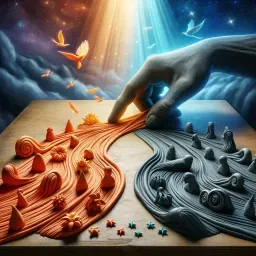”The fault, dear Brutus,
is not in our stars, but in ourselves“

- Meaning
- The quote suggests that destiny is not determined by external cosmic forces (stars being a common metaphor for fate or destiny), but rather by human actions and choices. The implication is that individuals have the power over their own decisions and thus, are responsible for the outcomes of their lives, rather than being mere puppets to fate.
- Allegory
- The crossroads represent critical life decisions, the paths symbolize the different outcomes based on these choices, and the compass indicates control and personal responsibility in choosing a direction. The contrasting nature of the paths highlights the consequences of one's choices, while the stars, although present, do not compel the individual, signifying that fate does not seal one's destiny - personal actions do. This drawing profoundly interprets the concept that our lives' outcomes are more about our choices than predetermined fate.
- Applicability
- This quote is applicable in today’s context where people often attribute their failures or circumstances to external factors or bad luck. Understanding and embracing the message from this quote encourages individuals to take personal responsibility for their actions and decisions, promoting a proactive and accountable approach to life's challenges.
- Impact
- The impact of this phrase is significant as it has entered common use to imply the importance of personal responsibility. It has been cited in numerous works and discussions focusing on the concepts of fate and personal accountability. The phrase also inspires dialogue in philosophical, psychological, and sociological contexts, assessing human behavior and decision-making processes.
- Historical Context
- The phrase originates from the early 17th century, specifically from Shakespeare's play "Julius Caesar" which was written in 1599. The historical context of the play is set in ancient Rome, and the phrase itself reflects the ongoing philosophical debate of that era regarding free will versus determinism—a topic that was pertinent in the Renaissance period.
- Criticisms
- While this phrase promotes taking personal responsibility, critics might argue it oversimplifies complex situations where external factors play a dominant role. This interpretation could potentially dismiss the systemic issues and injustices that may hinder an individual’s ability to shape their destiny.
- Variations
- The interpretation of this phrase might vary across different cultures. In individualistic societies, it is often seen as a motivating factor for personal achievement and responsibility. Conversely, in more collectivist societies, the emphasis might be slightly adjusted to reflect the interconnected nature of individuals within the community, focusing on collective rather than individual responsibility.
-

Alea iacta est
-

The fool doth think he is wise, but the wise man knows himself to be a fool.
-

It is not in the stars to hold our destiny but in ourselves
-

Hell is empty and all the devils are here.
-

Doubt thou the stars are fire; Doubt that the sun doth move; Doubt truth to be a liar; But never doubt I love.
-

This above all: to thine own self be true, and it must follow, as the night the day, thou canst not then be false to any man.
-

Love looks not with the eyes but with the mind.
-

There is nothing either good or bad, but thinking makes it so.
-

Be not afraid of greatness. Some are born great, some achieve greatness, and others have greatness thrust upon them.
-

To be, or not to be, that is the question.
-

Love all, trust a few, Do wrong to none: be able for thine enemy Rather in power than use; and keep thy friend Under thy own life's key: be check'd for silence, But never tax'd for speech.
No Comments